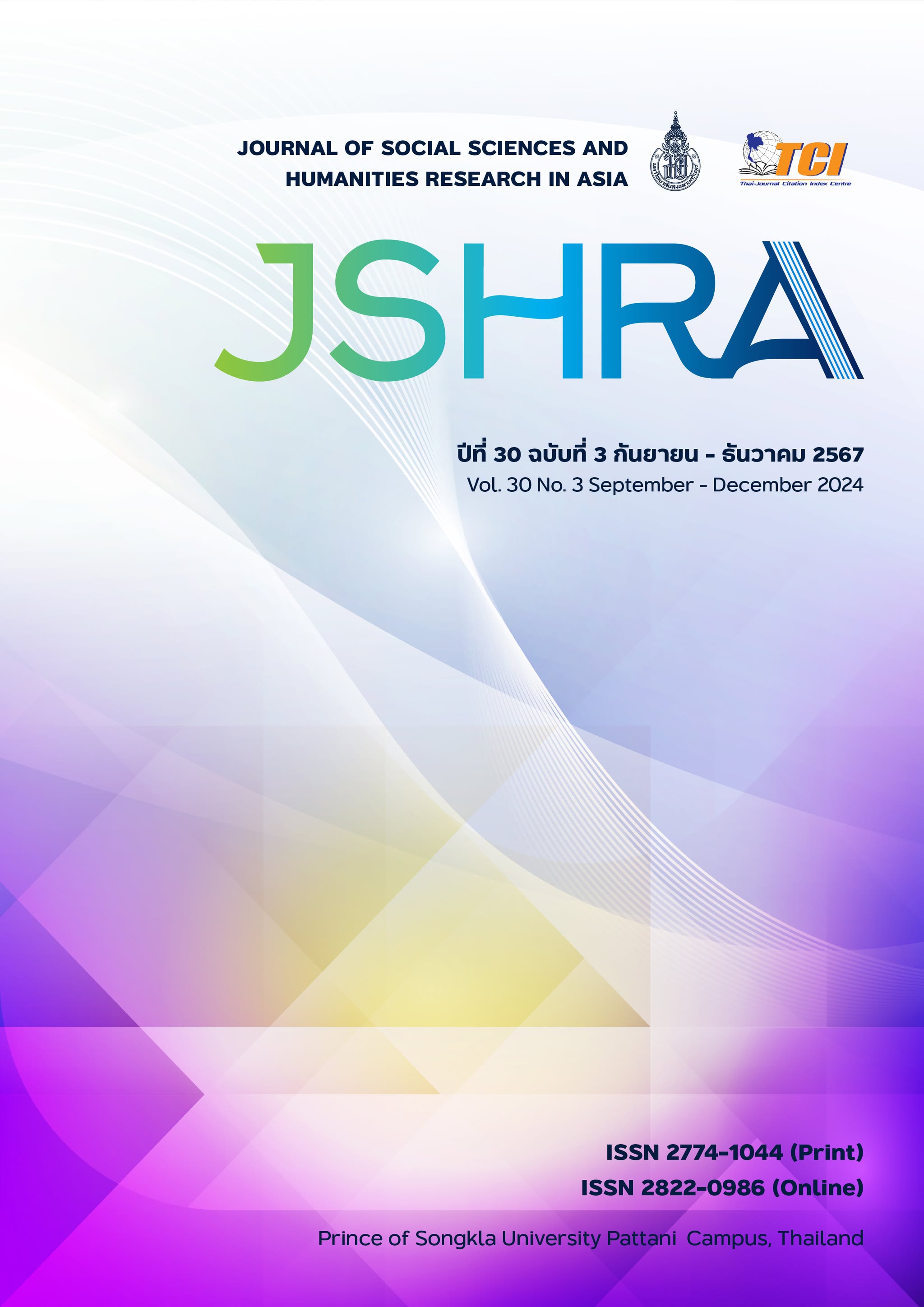Public Labour Market and Educational Mismatch in Thailand: Mixed-Method Study in Case of Community Development Specialist
Keywords:
Community Development Specialist, Educational Mismatch, Public Labour MarketAbstract
Thailand has a total of fifty-four higher education institutions offering sixty-two programs in community development and social development within the field of social sciences and humanities. Graduates from these programs typically specialize in the government sector as Community Development Specialist (CDS). A recent study aimed to assess the mismatch in the public labour market for CDS and explain the performance issues in this field. The study used a mixed-method approach, analyzing official records of CDS appointments for the purpose of quantitative analysis while for the qualitative analysis, interviews with CDS and the Head of the Community Development District Office were conducted.The results revealed that most of the 869 Community Developers placed/appointed during 2019 and 2021 possessed educational backgrounds in science and technology, indicating a horizontal mismatch in their skills and the demands of the profession. Interviews emphasized the wide range of talents needed to become a successful CDS and highlighted the importance of aligning community development policies with government initiatives. The study suggests that course designers in the field of community development should create a curriculum integrating knowledge and skills from various disciplines to enhance the proficiency of students pursuing these studies in Thailand, hence improving their job prospects.
References
Albert, C., Davia, M. A., & Legazpe, N. (2023). Educational mismatch in recent university graduates: The role of labour mobility. Journal of Youth Studies, 26(1), 113-135. https://doi.org/10.1080/13676261.2021.1981840
Bol, T., Eller, C. C., van de Werfhorst, H. G., & DiPrete, T. A. (2019). School-to-Work Linkages, Educational Mismatches, and Labour Market Outcomes. American Sociological Review, 84(2), 275–307. https://doi.org/10.1177/0003122419836081
Cervantes, C. V., & Cooper, R. (2021). Labour market implications of education mismatch. NBER Working Paper No. 28169.
Creswell, J. W. (2013). Qualitative inquiry & research design: Choosing among Five approaches (3rd ed.). Thousand Oaks, CA: SAGE. Department of Community Development. (2019a). Competitive examinations for recruitment or placement in Community Development Specialist at the Practitioner Level, 12 June 2019. Bangkok: Author.
Department of Community Development. (2019b). The list of passing candidates and abandon appointment candidates of Community Development Specialist at the Practitioner Level, 30 September 2019. Bangkok: Author.
Department of Community Development. (2019c). Civil servant development projects: Pre-Community Development Specialist bath 111. Bangkok: Author.
Dolton, P., & Vignoles, A. (2000). The incidence and effects of overeducation in the U.K. graduate labour market. Economics of Education Review, 19(2), 179-198. https://doi.org/10.1016/S0272-7757(97)00036-8
Gaeta, G. L., Lavadera, G. L., & Pastore, F. (2022). The effect of job-education vertical mismatch on wages among recent PhD graduates: Evidence from an instrumental variable analysis. Italian Economic Journal, 8(2), 197-225. https://doi.org/10.1007/s40797-021-00167-y
Higher Education Information, Office of the Higher Education Commission. (2021). Higher education statistics: Graduates. Retrieved from http://www.info.mua.go.th/info/table_stat_03.php?id_member=
International Labour Organization. (2020). What is skills mismatch and why should we care? Retrieved from https://www.ilo.org/skills/Whatsnew/WCMS_740388/lang--en/index.htm
Korpi, T., & Tåhlin, M. (2009). Educational mismatch, wages, and wage growth: Overeducationin Sweden, 1974–2000. Labour Economics, 16(2), 183-193.
McGuinness, S., Whelan, A., & Bergin, A. (2016). Is there a role for higher education institutions in improving the quality of first employment? B.E. Journal of Economic Analysis and Policy, 16(4), 12-23.
McGuiness, S., Pouliakas, K., & Redmond, P. (2017). How useful is the concept of skills mismatch? IZA Institute of Labour Economics. (Discussion Paper No. 10786).
Montt, G. (2017). Field-of-study mismatch and overqualification: Labour market correlates and their wage penalty. Journal of Labour Economics, 6(2), 1-20. https://doi.org/10.1186/s40172-016-0052-x
Morsy, H., & Mukasa, A. (2019). Youth jobs, skill and educational mismatches in Africa. MPRA Paper (No. 100394). https://mpra.ub.uni-muenchen.de/100394/National
Statistical Office, Ministry of Digital Economy and Society. (2021). Summary of working conditions of Thai people (December 2020). Retrieved from http://www.nso.go.th/sites/2014/DocLib13/ด้านสังคม/สาขาแรงงาน/ภาวะการทำงานของประชากร/2563/Report_12_63.pdf
National Statistical Office, Thailand. (2023). The labour force survey: Monthly survey summary. Retrieved from https://www.nso.go.th/nsoweb/nso/survey_detail/9u?set_lang=en
Office of the Civil Service Commission. (2009). Community development specialist (the 1st amendment). Retrieved from https://www.ocsc.go.th/job/วิิชาการพััฒนาชุุมชน
Office of the Civil Service Commission. (2021). National qualification accreditation. Retrieved from http://e-accreditation.ocsc.go.th/acc/index.html
Office of the National Economic and Social Development Council. (2023). NESDC reveals the results of a survey of Thai people 'educational mismatch', pointing out obstacle to 'economy-income' expansion. Retrieved from https://www.naewna.com/local/758866
Okolie, U. C., Igwe, P. A., Nwosu, H. E., Eneje, B. C., & Mlanga, S. (2020). Enhancing graduateemployability: Why do higher education institutions have problems with teaching generic skills? Policy Futures in Education, 18(2), 294–313. https://doi.org/10.1177/1478210319864824
Pala, A. H., Bichanga, W., & Atambo, W. (2015). Effects of educational mismatch on employee performance: A case study of Co-operative Bank of Kenya Ltd. Global Business and Economics Research Journal, 4(5), 1-15.
Pholphirul, P., Khong-ngern, D., & Thowladda, K. (2016). Educational mismatches and labour market outcomes. Development Economic Review, 10(2), 118-150.
Policy, Strategy, and Planning Division, Prince of Songkla University. (2020). Summary of information on the employment situation of graduates Prince of Songkla University, academic year 2018 (information as of June 25, 2020). Retrieved from https://planning.psu.ac.th/index.php/component/content/article/job-psu?catid=17&Itemid=101
Policy, Strategy, and Planning Division, Prince of Songkla University. (2021). Table summarizing information on graduate employment conditions, Prince of Songkla University, academic year 2019 (information as of July 31, 2022) 1 year after graduation. Retrieved from https://planning.psu.ac.th/index.php/component/content/article/job-psu?catid=17&Itemid=101
Qadeer, A., & Fatima, K. (2017). Education-job mismatch among graduates of administrative staff: A case study of University of Gujrat. Matriks Sains Matematik, 1(1), 40-44. https://doi.org/10.26480/msmk.01.2017.40.44
R Core Team. (2021). R: A language and environment for statistical computing (Version 4.0) [Computer software]. Retrieved from https://cran.r-project.org
Salas‑Velasco, M. (2021). Mapping the (mis)match of university degrees in the graduate labour market. Journal for Labour Market Research, 55(14), 1-23. https://doi.org/10.1186/s12651‑021‑00297‑x
Sam, V. (2020). Impacts of educational mismatches on job satisfaction: The case of university graduates in Cambodia. International Journal of Manpower, 41(1), 84-99. https://doi.org/10.1108/IJM-07-2018-0229
Satimanon, T. (2017). Thailand’s labour mismatch: Contemporary situations and solutions. NIDA Case Research Journal, 9(1), 1-38.
Sellami, S., Verhaes, D., & Van Trier, W. (2018). How to measure field-of-study mismatch? A comparative analysis of the different methods. Labour, 32(4), 141-173.
Senkrua, A. (2015). The mismatch in Thai labour market: Overeducation. CMU Journal ECON, 19(1), 92-116.
The jamovi project. (2021). Jamovi (Version 1.8) [Computer Software]. Retrieved from https://www.jamovi.org
Tongsamsi, I., & Tongsamsi, K. (2016, May 26-29). Educational mismatch among Community Development Worker. The 26th Thaksin University National Conference: Integrating Research into Society (pp. 601-606). Buri Sriphu Boutique, Hatyai, Songkhla.
Tongsamsi, I., & Tongsamsi, K. (2019, July 12-13). Labour market and educational mismatch: A case study of new Community Development Workers (2017-2019). The 10th Hatyai National and International Conference (pp. 895-905). Hatyai University, Hatyai, Songkhla.
Vecchi, M., Savic, M., & Romiti, M. (2021). Skill mismatch among UK graduates. London: Economic Statistics Centre of Excellence, National Institute of Economic and Social Research.
Veselinović, L., Mangafić, J., & Turulja, L. (2020). The effect of education-job mismatch on net income: Evidence from a developing country. Economic Research-Ekonomska Istraživanja, 33(1), 2648-2669. https://doi.org/10.1080/1331677X.2020.1723427
Ziberi, B. (2020). Skills mismatch in the labour market a precondition of brain-drain phenomenon in developing countries with special emphasis in Kosovo. Bilimler Dergisi Near Eastern Journal of Social Sciences, 6, 24-30.










